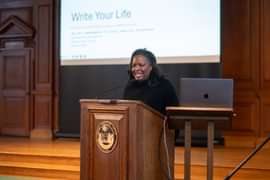November 17, 2022
Teaching behind bars
Alumnus gets an education from incarcerated studentsby Bill Littlefield ’66
“When I’m in class, I don’t feel like I’m in prison.”
One of the incarcerated students with whom I work said that to me after class the other day. He’s at the Northeastern Correctional Center, a minimum-security facility across the street from the medium-security prison at the rotary in Concord, Massachusetts. He’s been at Northeastern, which they call “the farm,” since last winter. Before that he’d been across the street, where I’d been working one day a week since 2018 with students enrolled in the Emerson Prison Initiative (EPI).
 Bill Littlefield '66
Bill Littlefield '66
As I drove home from class that day, I found myself thinking, “Well, there’s the bumper sticker: ‘When I’m in class, I don’t feel like I’m in prison.’”
EPI is one of several programs in Massachusetts through which incarcerated people can earn a college degree. It’s a longer haul than most undergraduates usually face, but that doesn’t much worry the students at MCI-Concord, many of whom are serving very long sentences.
The competition for spots in these programs is fierce. That’s one thing the programs have in common. Another is that no bumper sticker could ever distill the importance of these programs or of the smart, supportive, and respectful students in them.
My experience with incarcerated students should have begun 30 years ago. That was when a colleague of mine at Curry College, where I taught in the English Department for almost 40 years, invited me to participate in the program he’d established for men serving time at what was then known as Walpole State Prison.
“I’m sure it’s great,” I told him. “Maybe next semester.”
“Next semester” didn’t come until I’d retired from both teaching and the work I’d been doing at NPR and its local radio affiliate, WBUR. At that point I decided to retire to something, something I wished I hadn’t avoided.
I learned that the Emerson Prison Initiative had no problem taking on the world’s oldest teaching assistant. I left my wallet, watch, and keys in a small locker in the waiting room at the facility, which I’d driven past several dozen times over the years. I was escorted by a correctional officer into the classroom in the yard of the 144-year-old building and joined a public speaking class in which a dozen men would try out their presentations on each other and on me.
No bumper sticker could ever distill the importance of these programs or of the smart, supportive, and respectful students in them.
From that first day, the students with whom I worked welcomed me. They were sharp, funny, and more supportive of one another than any group of students I’ve ever met. They enjoyed each other’s company enormously. They took their academic work seriously. They respected themselves and their classmates, their professors and teaching assistants. I liked them.
 In addition to working with the Emerson Prison Initiative, Bill Littlefield ’66 recently completed his latest novel, Mercy, published by Black Rose Writing in 2022.
In addition to working with the Emerson Prison Initiative, Bill Littlefield ’66 recently completed his latest novel, Mercy, published by Black Rose Writing in 2022.
It is natural, I guess, for anybody meeting pleasant, articulate, grateful incarcerated men to wonder what they’d done to get themselves incarcerated, some of them for the rest of their lives. Short answer: They’d done a lot of things. But the program addresses the students as people and partners in the educational process, not as “convicted felons.”
Often the lives of these students have been complicated and characterized by limitations and a narrow range of choices many of us have never had to manage, and a lot of students have faced those limitations since childhood. The program operates on the assertion—well established by statistics regarding recidivism—that a classroom experience can provide a transformational path for these students.
Half a dozen of the students with whom I began working in 2018 received their bachelors’ degrees in a ceremony at MCI-Concord in September. Tears flowed. The food, prepared by incarcerated men at “the farm,” was terrific. For some of the other members of that class, graduation had been delayed because they were transferred to other prisons. Two of them have been paroled, and they’ll finish their degrees by taking classes with students who’ve probably never seen the inside of a prison.
I have no doubt these men will enrich the lives of those much younger students, just as they have enriched mine.
Other Stories

Best-selling author Rachel Howzell Hall delivers MLK Day keynote




